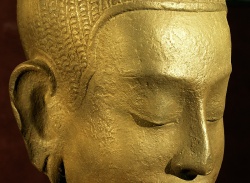Difference between revisions of "Abhayagiri Buddhist Monastery"
m (Text replacement - "mark" to "mark") |
m (1 revision: Robo text replace 30 sept) |
(No difference)
| |
Latest revision as of 17:36, 30 September 2013
Abhayagiri, or Fearless Mountain in the canonical Language of Pali, is a Theravadin Buddhist Monastery of the Thai Forest Tradition in Redwood Valley, California. Its chief priorities are the teaching of Buddhist ethics, together with traditional Concentration and insight Meditation techniques, as an effective Way of dissolving stress.
Origins
About 13 miles (21 km) north of Ukiah, the Monastery has its origins in the 1980s when the UK-based Ajahn Sumedho, foremost western Disciple of the Thai Meditation master Ajahn Chah, started getting requests to teach in California. Visits by either himself or one of his senior Monks or Nuns resulted in the Sanghapala Foundation being set up in 1988. The Monastery's first 120 acres (0.49 km2) were given to the foundation by the devotees of Chan Master Hsuan Hua, founder of the City of Ten Thousand Buddhas in Talmage, before he died in 1995. Currently, the Monastery rests on 280 acres (1.1 km2) of mountainous forest land.
Lifestyle
At the Time of Writing there were a dozen renunciates in permanent residence: one abbot, two anagarikas or postulants, two Samaneras or novices and twelve fully ordained Bhikkhus. Male residents live in small huts nestled in the forest. Female residents live in a house which was separately donated to the Monastery. Guest teachers come from the forests of Thailand as well as England. The daily schedule, in keeping with tradition, is rigorous. Most residents (monastics and lay visitors) rise well before sunrise. Morning Puja, as it's known, is at 5am and lasts an hour-and-a-half. This is followed by a half-hour chore period and a simple oatmeal breakfast. At 7:30 am a work meeting takes place and a short Dhamma reflection is given. There are then three hours of physical labor, ending with lunch around 11:00 am, which has to be consumed before midday. There follows free Time for sitting and Walking meditation as well as Dhamma study. One can also walk around the extensive network of trails that wind about the mountainside. At 5:30 pm tea is served, sometimes accompanied by a Dhamma reading or discussion and, later, by a further Puja. On lunar observance days, which mark the four moon quarters, sitting and Walking meditation continue until 3am the following morning. Formal Dhamma talks are offered on Saturdays and lunar observance days.

